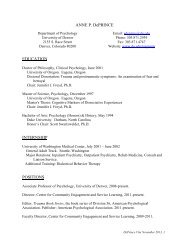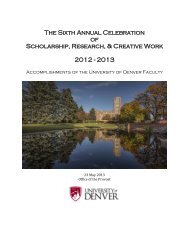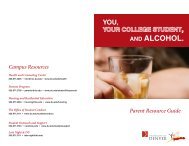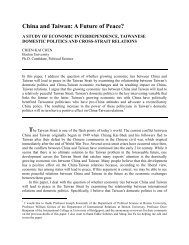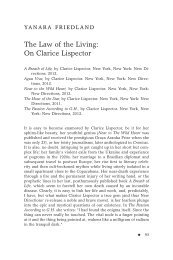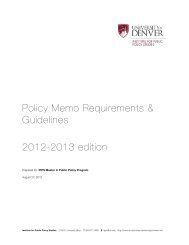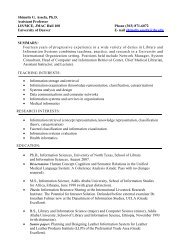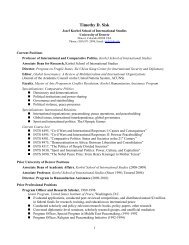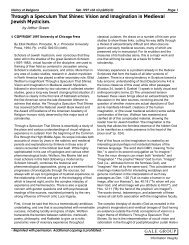Create successful ePaper yourself
Turn your PDF publications into a flip-book with our unique Google optimized e-Paper software.
gssw butler institute<br />
30 spring 12 gssw butler institute<br />
gssw bridge project<br />
ButLer inStitute BriDGe proJeCt<br />
Stacie Hanson (L), MSW,<br />
and Robin Leake, PhD<br />
Supporting<br />
Military Families<br />
with Child Support<br />
Enforcement<br />
Cases<br />
by Robin Leake, PhD<br />
Director, Research and Evaluation,<br />
Butler Institute for Families<br />
A 2009 report by the Defense Department shows that<br />
the stress <strong>of</strong> multiple deployments, financial issues<br />
and relocations have caused the divorce rate for service<br />
members to increase by approximately 3.6 percent for<br />
all military branches. This increased risk <strong>of</strong> divorce also<br />
means increased risk <strong>of</strong> legal child support issues.<br />
Now the Colorado Division <strong>of</strong> Child Support Enforcement<br />
(CSE) is partnering with El Paso County, Colorado, and<br />
four Colorado military bases to help educate and support<br />
active duty military personnel and their families around<br />
child support issues. The project also seeks to streamline<br />
services for processing cases and handling changes <strong>of</strong><br />
custody reviews for military families. The three-year<br />
project is funded by a grant from the Health and Human<br />
Services Administration for Children and Families, Child<br />
Support Enforcement agency.<br />
There are almost 18,000 child support cases in El Paso<br />
County, and about 10 percent <strong>of</strong> these involve active duty,<br />
reservist or retired military members. El Paso County<br />
child support services are provided by Young Williams,<br />
a private agency located in Colorado Springs, which has<br />
traditionally had a large, transient military population.<br />
Four active military bases surround Colorado Springs: Fort<br />
Carson, Peterson Air Force Base, Schriever Air Force Base<br />
and the Air Force Academy.<br />
CSE has found that military personnel struggle to<br />
financially support their children, make custody and<br />
parenting decisions that fit with their job (particularly<br />
for those deployed overseas), and access critical legal<br />
advice concerning custody, child support payments and<br />
parenting time.<br />
<strong>GSSW</strong>’s Butler Institute for Families will evaluate the<br />
implementation and outcomes <strong>of</strong> this project, as well<br />
as conduct a needs assessment for military families<br />
to gain a better understanding <strong>of</strong> the unique needs <strong>of</strong><br />
these families and identify support services necessary to<br />
address these needs. I will co-lead this project, along with<br />
Research Associate Stacie Hanson, MSW.<br />
To read more about this and other Butler Institute projects<br />
online click here. Also, visit us on Facebook.<br />
Bridging Language Barriers<br />
The program model <strong>of</strong> <strong>GSSW</strong>’s non-pr<strong>of</strong>it Bridge Project views reading skills as one<br />
<strong>of</strong> the most significant keys to the healthy development and success <strong>of</strong> the children<br />
and youth it serves in <strong>Denver</strong>’s public housing neighborhoods. The fact that Bridge<br />
literacy programs and tutoring consistently raise reading scores year after year seems<br />
all the more remarkable considering the diversity <strong>of</strong> cultures and languages Bridge<br />
families represent.<br />
Currently, the Bridge Project serves children from 14 countries* outside the U. S.,<br />
many <strong>of</strong> them recent arrivals coping not only with an unfamiliar culture, but also<br />
with a significant language barrier. The kids’ native languages include Amaric, Arabic,<br />
Chinese/Cantonese, French, Karin, Khmer, Liberian Kreyo, Maay Maay, Mandarin,<br />
Spanish, Sudanese, Swahili, Thai, Tribal Somali and Vietnamese.<br />
“We have an extremely diverse population <strong>of</strong> participants and families,” says Bridge<br />
Executive Director Molly Calhoun. “In addition to promoting multiculturalism and<br />
mutual respect within the program, our staff works hard to find tutors or staff members<br />
who speak the appropriate languages to work one-on-one with students whose first<br />
language is something other than English.”<br />
Several Bridge staff members speak Spanish, and one speaks Vietnamese. Additionally,<br />
Bridge participants who receive college or trade school scholarships from the program<br />
are required to complete 40 hours <strong>of</strong> volunteer service per academic year. Because<br />
these scholarship students come from backgrounds very similar to those <strong>of</strong> current<br />
participants, they help bridge many <strong>of</strong> the cultural and language barriers these younger<br />
students face.<br />
To learn more about the Bridge Project click here.<br />
*Bridge presently serves children and youth from Burma, Cambodia, China, Congo,<br />
Ethiopia, Israel, Liberia, Mexico, Saudi Arabia, Somalia, Sudan, Thailand, Uganda and<br />
Vietnam, in addition to the United States.<br />
Bridge Project<br />
Case Study<br />
Late last year, the Center for Housing Policy,<br />
research affiliate <strong>of</strong> the National Housing<br />
Conference (NHC), chose <strong>GSSW</strong>’s Bridge Project to<br />
be the subject <strong>of</strong> a case study. The Center works<br />
to broaden understanding <strong>of</strong> the nation’s housing<br />
challenges and to examine the impact <strong>of</strong> policies<br />
and programs developed to address these needs.<br />
The case study, entitled Using Public Housing to<br />
Strengthen Children’s Education, was presented<br />
at the How Housing Matters Conference, held on<br />
November 2 in Washington, DC.<br />
The conference was a project <strong>of</strong> the National<br />
Building Museum, in partnership with the John D.<br />
and Catherine T. MacArthur Foundation and the<br />
Office <strong>of</strong> Policy Development and Research, U. S.<br />
Department <strong>of</strong> Housing and Urban Development.<br />
Bridge Executive Director Molly Calhoun, MSW<br />
’05, was a participant in the conference panel<br />
discussion entitled “Housing as a Platform for<br />
Education.”<br />
Bridge Receives<br />
United Way Grant<br />
In February, <strong>Denver</strong>’s Mile High Chapter <strong>of</strong> the<br />
United Way chose the Bridge Project as one <strong>of</strong> just<br />
11 organizations to receive a grant from its Social<br />
Innovation Fund. Bridge must raise approximately<br />
$120,000 to be matched by the Fund.<br />
The Social Innovation Fund grant will allow<br />
Bridge to increase both the quality and quantity<br />
<strong>of</strong> its early literacy services. It will also enable<br />
the program to expand research and evaluation<br />
<strong>of</strong> its services, including comparison <strong>of</strong> Bridge<br />
outcomes with those <strong>of</strong> children in public housing<br />
neighborhoods without a Bridge Project site.<br />
gssw bridge project spring 12 31



